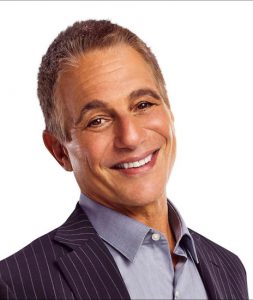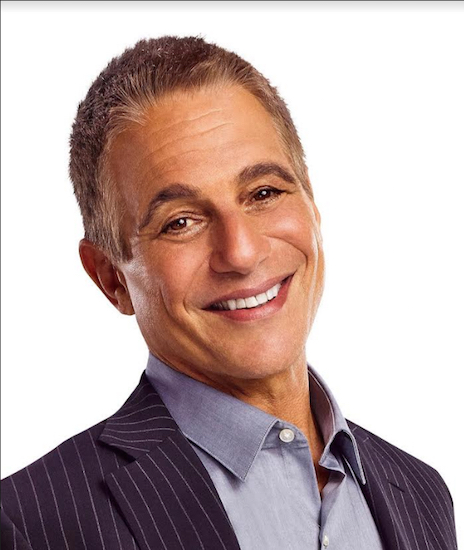
Who’s the Boss of Brooklyn? Tony Danza, of course
The Iconic Television Star Talks to the Eagle

Tony Danza is truly a jack of all trades. He is an actor, author, dancer, boxer and teacher, among other things. Danza has enjoyed one of the most long-lived careers in television, and he continues to find new avenues for his talents.
Born Anthony Salvatore Iadanza to hard-working Italian parents in East New York — his father was a sanitation man and his mother a bookkeeper —
Danza’s list of awards and honors is extensive. He has been nominated for four Golden Globe Awards for his work in the classic television series “Who’s the Boss” and “Taxi” and was nominated for an Emmy for his work in “The Practice.” In 1998, he won the People’s Choice Award for Favorite Male Performer in a New Television Series for his work on the 1997 sitcom “The Tony Danza Show.” In 1988, Danza received a star on the “Hollywood Walk of Fame.”
Danza, who will be performing at Brooklyn College on Nov. 20, recently took the time to talk with Brooklyn Eagle about his illustrious career.
Brooklyn Eagle: Welcome home to Brooklyn! What can we expect from your show “Standards & Stories” at the Brooklyn Center for the Performing Arts at Brooklyn College on Nov. 20?
Tony Danza: I’m so excited to be back in Brooklyn and playing at Brooklyn College. “Standards & Stories” is a show I wrote. It’s evolved from what used to be a big act with videos, elaborate sets, costumes and two dancing girls. I had all the trappings.
I shed all that and started doing a more personal act. I used to tell jokes and do a lot of shtick. So I decided I wanted to graduate, to grow up a little bit when I was doing it at the Carlyle, which had a more sophisticated audience. It’s basically a bunch of songs that I picked that evoke a certain feeling or help me tell a story. And the story is a narration about things that I think, things about myself. I talk about the city I love (New York).
I also have a band, and it’s an attempt to do a grown up act that is funny and entertaining. I get to sing a little, I get to dance a little, I even pull out a secret weapon, my ukulele. I try to adapt the American songbook to the ukulele.
BE: You were born and raised in the East New York section of Brooklyn. What was it like growing up there during the ’50s?
TD: Pitkin Avenue and Barbey Street. I was there until about ’55, and then we moved to Euclid Avenue in Cypress Hills. I was there until I was 15. Then we moved to Malverne, Long Island.
When I was a boy in Brooklyn, we had more independence. We were free to explore the neighborhood on our own. You would get up in the morning, say goodbye to your mother and take off on your bike, with the only restriction being that you had to be home by dinner. You had the ability to experience independence in your neighborhood. You knew everybody and people watched over you. You knew the cop on the corner.
It was a different world. I had the most beautiful, most wonderful childhood. I look back and think of all the games we used to play. I always had a Spaldeen (ball) in my bag. It cost about 25 cents and there were about 200 games you could play with it.
BE: After graduating from the University of Dubuque with a bachelor’s degree in history, you decided to pursue a career in boxing.
TD: To tell you the truth, I didn’t really decide. I got out of school; I didn’t want to teach, because I thought I was too young to teach anybody anything, so I took a bunch of odd jobs.
And then I got into a street fight. We used to fight just for fun. I remember I got into a fight and beat this guy who nobody thought I could beat. My friend entered me into the Golden Gloves as a result of that as a joke. The first year I had about five or six knockouts. I thought I was going to be the champion of the world.
I was in the semi-finals one year, and the next year I got beat in the final round by the eventual champ. Then I turned pro and I was boxing.
BE: In fact, you were a Golden Gloves boxer when you were discovered by a Hollywood producer in the gym. This worked out well since your first iconic character, Tony Banta, on the classic sitcom “Taxi,” was also a boxer.
TD: Well, I was training at Gleason’s Gym, and this guy walks in who said he was a TV producer and he had this show he was trying to pitch about a young boxer who trains at a gym owned by an old fighter, and it was called “Auggie.” The hook was that they couldn’t pay the rent, so they rented half the gym out to an aerobics instructor. So you had girls and you had boxers, and it was going to be a comedy.
The producer came in, saw me and asked me to read for the part of the young boxer. The show didn’t go anywhere, but I got an agent. The agent set me up for an audition for the movie “The Warriors” about a New York City street gang. And I got the part.
ABC had me on a series deal, and when they found out that I got this major movie, they sent me over to see Jim Brooks, who was casting for the part of Phil Ryan, an Irish heavyweight, for his new show “Taxi.” I had just been in a fight and I had a cast on my hand when I went in because I had broken my hand on the guy’s head. I had gotten hit a couple of times myself, and I had some marks on my face and I looked like a fighter. I read with Mandy Patinkin, who originally had Judd Hirsch’s part, and they made me an Italian middleweight instead of an Irish heavyweight. Boxing made all the difference.
I went from one minute being a club fighter who couldn’t put two quarters together to having to decide between a TV series and a major motion picture. I chose “Taxi” because it was something I knew.
BE: You appeared on “Taxi” for five seasons — the show’s entire run from 1975-1978. What a great show! And what a great cast: Judd Hirsch, Danny DeVito, Marilu Henner, Christopher Lloyd, Carol Kane and the late Jeff Conaway and Andy Kaufman. You worked with people who have real acting and comedic talent.
TD: I’m so happy I chose “Taxi.” I’m just so glad I did that show. And you know what? They all live near me now in the city. Judd, Danny, Chris and Carol all live around me on the Upper West Side.
BE: Do you ever get together?
TD: Of course, of course we do.
BE: You are one of the rare actors who has appeared in two classic TV series: “Taxi” and “Who’s the Boss.” You starred on “Who’s the Boss” as Tony Micelli from 1984-1992. What was it like working with incredible talents like Judith Light and Katherine Helmond?
TD: You know, Entertainment Weekly just featured us in a reunion issue a few weeks ago. They are the best cast you could ever work with. I see them too. I see Judith a lot. I talk to Katherine a lot. I speak to Alyssa [Milano] a lot. When she lived here, we used to see each other, and Danny [Pinatauro] comes up every once in a while as well. We’re all very close and we’re in constant contact.
BE: Alyssa Milano, who played your daughter on the show, has referred to you as a second father. That must be very rewarding to hear.
TD: One of the things that I am most proud of is that the two kids on that show turned out pretty good. The same producers who produced our show also produced “Different Strokes,” and the kids on that show had a terrible outcome. I really tried to make sure that we remembered they were kids. They were actors, of course, but they were kids first. We tried to make sure that they kept their grades up. We made a big deal about school, and we really tried to make it a place where it was not just a working environment. Danny was 6 and Alyssa was 10 when we started, so that was a big responsibility.
BE: You have said that your first love was teaching. As a former college English professor myself, I understand your aspirations of becoming an English teacher early in your career. But admirably, you became a teacher in 2009 after having enjoyed great success as an actor. You talk about that experience in your New York Times bestselling book (with the great title), “I’d Like to Apologize to Every Teacher I Ever Had: My Year as a Rookie Teacher at Northeast High.”
TD: Teaching is a hard profession. You find out that when you’re crying; you’re not alone. I cried so much. They make you cry. College presents its own unique set of obstacles, but 15 and 16 year olds, you just have to get them. You’re afraid you’ll lose them if you don’t reach them. I talk about this in my book. The hardest part is the emotional grind. You’re not trained for the emotional grind.
And so what happens is that in order to get the kids to work, the tactic you use is to show them that you care about them. You have to go out of your way to make sure they know you like them so they will do a modicum of work for you. The problem is that when they know you like them, they tell you about themselves, and some of the stuff they tell you is so upsetting. That grind, that’s the thing that gets you.
BE: I know you are very involved in charity work. Tell us about that.
TD: Let me tell you about PAL (Police Athletic League). I’m on the PAL board of directors, and we’re starting a new program called PAL acting. Because when you teach a kid how to act, you teach a kid how to act. I’m really excited about it. We did our first pilot program last summer. It was tough, but it ended up really well. We got two classes going this fall and winter that are bigger than the class we started in the summer, so we’ve started to expand, and I’m trying to raise money for it because I really think it can change kids’ lives.
BE: And you own an Italian grocery store in the city.
TD: Yes, it’s called Alleva, and it’s the oldest cheese and Italian specialty store in New York. It’s located at 188 Grand St. on the corner of Grand and Mulberry in Little Italy. Alleva is the name of the family who had it since 1892.
And we make mozzarella and we have the best ricotta and some of the best cheeses anywhere.
Sometimes I feel more like a curator than anything else, because it really is a piece of New York Italian-American history. My uncle Phil Capasso, who is 89, used to come into that store when he was 3 years old.
BE: Do you still have family in Brooklyn?
TD: Yes, I do, but they’re scattered around. I have an aunt that’s still there. You know, I go back every once in a while. My brother, who lives in California, came home recently and said he wanted to go back and see the house on Euclid Avenue. So we went back to visit the house we grew up in.
BE: What are some of your favorite places in Brooklyn — restaurants, parks, theaters, etc.?
TD: Peter Luger, of course. I love Gargiulo’s restaurant in Coney Island. They have a picture of me in Junior’s Cheesecake (in Flatbush). I love Prospect Park. You know, I’m on the walk of fame in Prospect Park. I was named the “King of Brooklyn” one year. And I used to fight at the Rollerama on 86th Street in (Bensonhurst) Brooklyn. Now I think it’s a fast-food place, but it used to be a roller rink and it doubled as a fight club. Prospect Hall was another place I used to love to fight at. I used to tell people, I never lost (a fight) in Brooklyn. I would go to New Jersey and get beat up, but in Brooklyn I was tough.
BE: What is the one thing besides your obvious talent that explains a career that has spanned 40 years and is still going strong? What’s your secret, Tony?
TD: You got to work, you got to be there, you got to show up, and you just got to care.
Tony Danza: Standards & Stories will play on Sunday, November 20, 2016 at 3pm at Brooklyn Center for the Performing Arts at Brooklyn College. For tickets, visit www.BrooklynCenter.org or call 718-951-4500.
Leave a Comment
Leave a Comment


